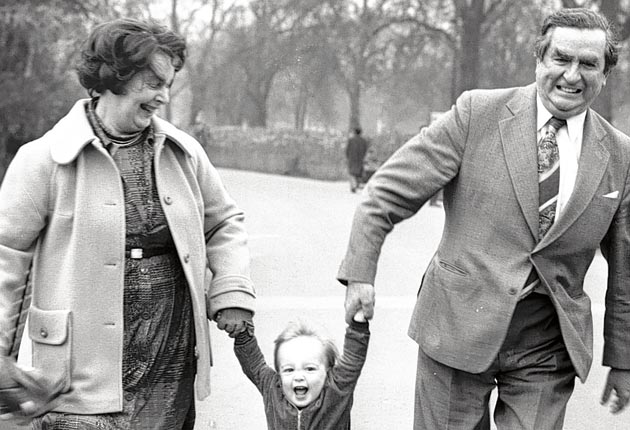Lady Healey: Writer and film-maker who supported her husband through turbulent political times

Edna May Healey and her husband Denis, one-time Labour Chancellor of the Exchequer, together built one of the great British political marriages of the second half of the 20th century. During their 65 years of marriage they successfully navigated the political rapids, especially during particularly turbulent economic times when they saw little of each other for months on end.
Edna's formula for dealing with her formidable husband's formidable workload took the form of initial stoicism and later creativity. She accepted his long absences but also surprised him and others with a late but sustained literary flowering. She produced a series of well-received books, many of them on the wives of well-known men. She admitted: "If I hadn't had my writing, I don't know what would have happened to me. I would have withered. Having one's own space is a great thing."
Her husband once looked likely to become leader of the Labour Party but, in an era of fierce infighting, he never made it, his brand of centre-right Labour politics being out of fashion. The pair were never consumed with regret – though she thought he would have made an outstanding Foreign Secretary – and they went on to share decades of idyllic retirement in the Sussex Downs. They would often say to each other: "AWL". This was their code for "Aren't we lucky?"
The couple met at Oxford before the Second World War when Edna, chairing a meeting of a Labour club, introduced a lecture by Denis on modern art. She recalled: "I was tremendously impressed by this know-all and remember saying, 'How do you know so much?'"
Denis said of her: "Everyone at Oxford thought she was beautiful, but I used to call her Tomato Face because she had such rosy cheeks."
Her father, a crane driver, had urged her to study hard and she went to grammar school. But when she won a scholarship to Oxford the local Baptist minister cautioned that she would be out of place among "aristocrats and public schoolboys."
She and Denis became close when she took a teaching job in his home town of Keighley in Yorkshire. But they never got engaged because the war started and because they were cautious about making commitments. They saw each other when Denis came home on leave, and corresponded, though Edna noted drily, "We wrote to each other, but I could have pinned his letters on the staff noticeboard, they were so non-committal."
When he finally proposed, in the summer of 1945, she recalled that his words were, "Well, I suppose we had better get it over with as soon as possible." Their honeymoon night, spent at a small Yorkshire inn, was memorable in its way. Edna remembered: "They put us in an annexe, a nearby barn with a trapdoor. We'd hardly settled when a candle appeared, followed by a little old woman who kept popping up out of the floor asking us if we'd like to hear her poems. We said, 'Not very much, thank you.'"
As he rose through the political ranks Edna encountered what has been called the invisible wife syndrome. She once recalled of Labour leader Harold Wilson: "In all the years that Denis worked with him I do not think that he exchanged more than a dozen words with me, or indeed was aware of my existence."
Outside high-level politics, however, she was active as a radio and television broadcaster and freelance lecturer. Denis acknowledged: "She's a better speaker than I am – I give them the facts; she can move people, make them cry." She in turn was unstinting in praising a husband known in the political world as a scathing bruiser.
"He has a gift of loving and a gift of bellowing," she said. "He has the most powerful brain. He is quite the most extraordinary person I have ever known. That's why I married him – because of this wonderful personality."
As Denis reached high office Edna was generally left to bring up their three children alone. Believing, as she put it, that a problem shared was a problem doubled, she sought to protect him from any family difficulties.
"You're a one-parent family if you're married to an MP," she once said. "I felt my role was to look after the children and save Denis from irritation and fuss so he could get on with his work." When the children grew up and left home she began to produce books: "While Denis plodded along, his head full of Treasury problems, I could be equally absorbed in my next chapter," she recalled.
Her first work, which was both a commercial success and regarded as perhaps her best, was Lady Unknown, a life of Victorian philanthropist Angela Burdett-Coutts. On reading it Denis exclaimed: "My God, this is good. My God, it's going to sell."
Other works which followed dealt with the stories of women married to famous men such as Karl Marx's wife Jenny, Charles Darwin's wife Emma and explorer David Livingstone's wife Mary. She also wrote a history of Coutts Bank and another of Buckingham Palace. In 2006 she published a memoir, Part of the Pattern: memoirs of a Wife at Westminster.
This was described as "mixing Hardy-like descriptions of poverty amid the wood glades during her Forest of Dean childhood with breezy miniatures of the famous men she has known – from Harold Wilson to General Montgomery– and, of course, her life with Denis."
David McKittrick
Edna May Edmunds, author and lecturer: born 14 June 1918; married 1945 Denis Healey (one son, two daughters); died 21 July 2010.
Subscribe to Independent Premium to bookmark this article
Want to bookmark your favourite articles and stories to read or reference later? Start your Independent Premium subscription today.

Join our commenting forum
Join thought-provoking conversations, follow other Independent readers and see their replies